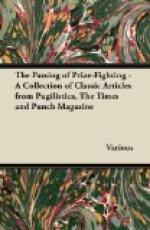I am wondering whether, among the myriad by-products of the War, there should be numbered a certain note of virility hitherto (if he will forgive me for saying so) foreign to the literary style of Mr. E. TEMPLE THURSTON. Because I have certainly found Enchantment (UNWIN) a far more vigorous and less saccharine affair than previous experience had led me to expect from him. For which reason I find it far and away my favourite of the stories by this author that I have so far encountered. I certainly think (for example) that not one of his Cities of Beautiful Barley-Sugar contains any figures so alive as those of John Desmond, the hard-drinking Irish squireen, and Mrs. Slattery, his adoring housekeeper. There is red blood in both, and not less in Charles Stuart, a hero whose earlier adventures with smugglers, secret passages and the like have an almost STEVENSONIAN vigour. All the life of impoverished Waterpark, with its wonderful drawing-room full of precarious furniture, is excellently drawn. I willingly allow Mr. THURSTON so much of his earlier manner as is implied in the (quite pleasant) conceit of the fairy-tale. The point is that the real tale here is neither of fairies nor of sugar dolls, but of genuine human beings, vastly entertaining to read about and quite convincingly credible. I can only entreat the author to continue this rationing of sentiment for our mutual benefit.
* * * * *
When a book rejoices in such a title as The Amazing Years (HODDER AND STOUGHTON) and begins with a prosperous English family contemplating their summer holiday in August 1914, you may be tolerably certain beforehand of its subject-matter. When, moreover, the name on the title-page is that of Mr. W. PETT RIDGE, you may with equal security anticipate that, whatever troubles befall this English family by the way, they will eventually reach a happy ending, and find all for the best in the best of all genially humorous worlds. As indeed it proves. But of course the Hilliers were exceptionally fortunate in the fact that when the crash came they had one of those quite invaluable super-domestics whom Mr. PETT RIDGE delights in to steer them back to prosperity. The story tells us how the KAISER compelled the Hilliers to leave “The Croft,” and how that very capable woman, Miss Weston, restored it to them again, chiefly by the aid of her antique shop; and to anyone who has recently been a customer in such an establishment this result fully explains itself. I need not further enlarge upon the theme of the book. Your previous knowledge of Mr. PETT RIDGE’S method will enable you to imagine how the various members of the Hillier household confront the changes brought by The Amazing Years; but this will not make you less anxious to read it for yourself in the author’s own inimitable telling. I won’t call this his best novel; now and again, indeed, there seemed rather too much padding for so slender a plot; but, take it for all in all, and bearing in mind the strange fact that we all love to read about events with which we are already familiar, I can at least promise you a cheery and optimistic entertainment.




